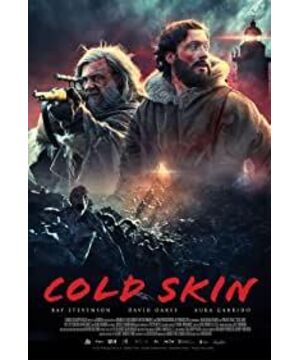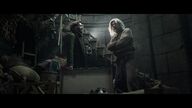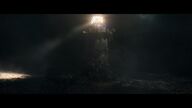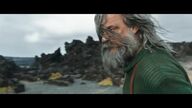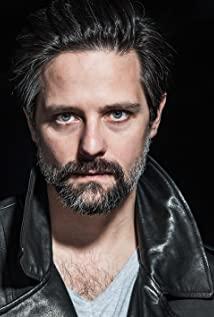Humanity as beast in makeup
- "The Legend of Ice Skin" and the Human Nature of War
text = empty language
"The Legend of Ice Skin" is adapted from the novel of the same name, which was written in Spanish by a Spanish anthropologist. This is not a mere bizarre story, but incorporates a clear anthropological concept. The film's adaptation masks a lot of subtext, so it doesn't seem very friendly to audiences who haven't read the original story. However, this does not mean that you have to read the novel to understand what the movie is talking about. Its intention is still quite clearly shown in the pictures and lines. This story takes the world war as the background of the era. Although the story takes place in the wilderness and the layout is not large, it directly points to the human root of this war. To put it succinctly, this story is about the entanglement between human nature and animal nature, love and hate.
Because of this movie, the definite plot is already so clear, and the unclear and indeterminate part of the plot is not something that should be considered too much here, so here is the line of thought involved in this movie.
The clues to understanding the story of this film are clearly shown in the film. This clue is the evolution of human nature. The evolution of human nature at multiple levels involves three characters: Nietzsche, Fraser, and Darwin. Nietzsche's thought is associated with spiritual evolution. The film begins with Nietzsche's 146th motto in "Beyond Good and Evil" in Spanish. An English expression is "He who fights with monsters should be careful lest he thereby become a monster. And if thou gaze long into an abyss, the abyss will also gaze into thee." (The reason why I fished out the English expression is that the Chinese translation of Huaxia Publishing House in 1999 I could find was a random translation.) Those who fight monsters should be wary of becoming monsters , those who gaze into the abyss will also be gazed at by the abyss. This sentence is the basic gist of the story, but it's a bit of a macro. The protagonist's words provide a microscopic description of this theme: the person we hate is always not far from us, and the person we love cannot be intimate.
On the surface, the story is about two people fighting monsters on an isolated island. The "monster" not far from these two people has been trying to devour them, and these two people are also trying to conquer this group of monsters. This is the struggle between man and beast—“human nature and beast nature”—and the result of the struggle. In the constant struggle, the two eventually became "monsters" - savages, or "people not far from monsters", or "people not far from civilization".
They are far away from civilization, and at this time, the civilization to which they belong is engaged in a greater struggle - a world war. This is a struggle between civilized people, but it is also a struggle between human nature and animal nature. Either side of the war can see itself as a righteous-civilization, and an enemy as an evil-monster. So they let down their vigilance, so that while venting themselves to the fullest, they walked towards the "monster". Aliens are monsters. For bystanders of World War I, it is easy to see both sides as imperialist monsters; World War II involved more countries, and once they were involved in the war, it was necessary to distinguish between different parties, the empire was no longer so abhorrent, militarism become the exclusive possession of monsters. As a result of World War II, the Nazis became the label of monsters—the Nazis regarded Britain and the United States as monsters to conquer and kill; Britain and the United States regarded the Nazis as monsters to conquer and kill; as a result of the struggle, "Nazis" eventually became the social system. monster. The movie says, "Killing and conquering, that's what humans do." Conquerors will write progressive historical stories, and they will say: Justice finally triumphs over evil. However, there is no God in the beginning that dictates which side is more human. The process of fighting is the entanglement of animal nature and animal nature. In this film, the fight revolves around the lighthouse, and perhaps the symbolism of the lighthouse is clear: it is a sign pointing to justice.
It is too macroscopic to say this, and too macroscopic expressions are mostly wrong, and they will also become narrative "monsters". At the micro level, the process of fighting is entwined by love and hate. Both love and hate are necessary and require a balance. ——“The person we hate is always not far from us, and the person we love cannot be intimate”——“Humanity” is in this micro-level balance. However, war-fighting is still dominated by bestiality, by hate. The war has turned both sides into monsters, although each monster thinks he holds the banner of a just cause. A Japanese philosopher is quoted in the film to illustrate this point: "A good warrior is not defined by the cause he defends, but by the performance of his struggle." What the perfect warrior sees is not the enemy, but the "enemy"; he kills not the person from the opposite side, but the devil from the opposite side. - This is a transformation of civilization modification. In daily civilization, killing is the greatest sin, but in war, in order to cover up the evil of killing, killing is no longer killing, but killing the monster on the opposite side.
In "Legend of Ice Skin", the attitudes of the two weathermen are different, the young technicians tend to have a loving attitude, and the old technicians tend to have a hate attitude. In the film's final fight with the monster, the two fight over how to treat the monster -- a battle of which should dominate, love or hate. When the young weatherman was about to lose, he shouted to the maddened opponent with "the slogan of civilization": "You are not a murderer"! At this time, the old weatherman put down his axe, shouted "love" several times, walked towards the herd, and was swallowed by the herd. Regarding the actions of the old weatherman, there are two kinds of attitudes: negative and positive. Looking at it positively, the old weatherman realized that he was "fighting with monsters" and made himself a monster, so he was in the maintenance of human nature. Destroyed himself; looking at it negatively, the old weatherman, as a cynic, despised the hypocrisy of the so-called "love" slogan, so he let the animal nature completely engulf him in despair of human nature. ...In any case, the fight will get its own answer when it's over.
The word "humanity" can actually be said to be a monster of language, as if people and beasts really have completely different attributes - to a certain extent, "justice" is also a monster of language. The production mechanism of this language monster, for the narrative of this film, can be dictated by Darwin and Fraser.
Evolution was the manifestation of the progressive belief in nineteenth-century Europe, and Darwin's contribution was to provide the mechanism of speciation for this conception of progress, making it seem scientifically justified, and at the same time destroying this ideal of progress. Although Darwin's human origins linked the human species with "lower" apes and opened the channel to "reduce" human nature to animal nature, European civilized people still converted this channel from animal nature with a sense of self-superiority A one-way street to human progress. Until the world war broke out, the animal nature of human beings was vividly displayed. Of course, "Kill that outlier!" was given out as a natural message, not only during the world wars, but even in the current turmoil of our lives. From this point of view, the theory of biological evolution does not degrade human nature. Humans are a kind of beasts, and beasts still surround human nature.
In "Legend of Ice Skin", when the young weatherman turns over the old weatherman's notes, some notes say, "Darwin is wrong." The notebook also appears to depict a diagram of the production of humans and amphibians. For "Darwin was wrong", there can be two levels of meaning: the first level, if "Darwin" is broadly understood as the concept of evolution in the nineteenth century, then "Darwin was wrong" can mean "biological evolution" "The concept is wrong, or more broadly that the progress from animal nature to human nature is wrong; on the second level, if "Darwin" is specifically understood as the biological mechanism of species occurrence, then referring to the accompanying picture, "Darwin is wrong "The view that can represent reproductive isolation and its corresponding species is wrong. No matter what kind of understanding, for the ideological theme of "Legend of Ice Skin", it can be used to show that human nature is not as progressive as people have portrayed in ideology and propaganda, and the boundary between it and animal nature is often blurred. of.
Another level is the evolution of scientific culture, which is expressed by anthropologist Fraser, whose book "The Golden Bough" is a classic study on science-witchcraft and its corresponding origins of human culture. Frozen seems to mention Fraser only once in the movie, when the young weatherman first met the old weatherman when he found Fraser's writings on the floor, which Granner denied he read. book of. Frazier is more important to understand the plot of the movie, but I can't talk too much about it here...
View more about Cold Skin reviews


